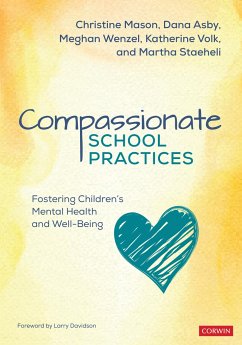Christine Y. Mason (Founder and Center for Educ Executive Director, Dana Asby (Director of Innovation & Center for Ed Research Support, Meghan Wenzel (Center for Educational Improvement Researcher)
Compassionate School Practices
Fostering Children's Mental Health and Well-Being
Christine Y. Mason (Founder and Center for Educ Executive Director, Dana Asby (Director of Innovation & Center for Ed Research Support, Meghan Wenzel (Center for Educational Improvement Researcher)
Compassionate School Practices
Fostering Children's Mental Health and Well-Being
- Broschiertes Buch
- Merkliste
- Auf die Merkliste
- Bewerten Bewerten
- Teilen
- Produkt teilen
- Produkterinnerung
- Produkterinnerung
Already Ready For What Will Come - SEL For A Culture Of Care Is your school prepared to care for all of the students, staff, and families in your community? Sadly, your school might be the only point of care for many students. Be already ready--Establish a compassionate cultural foundation for strong relationships and holistic skills to weather stress, trauma, and promote well-being for your entire school population by leaning into this approach to leadership and social emotional learning. Readers will find: ? Practical strategies & activities ? An implementation framework for every grade ?…mehr
Andere Kunden interessierten sich auch für
![Compassionate Leadership for School Belonging Compassionate Leadership for School Belonging]() Kathryn RileyCompassionate Leadership for School Belonging31,99 €
Kathryn RileyCompassionate Leadership for School Belonging31,99 €![Compassionate Leadership for School Improvement and Renewal Compassionate Leadership for School Improvement and Renewal]() Compassionate Leadership for School Improvement and Renewal112,99 €
Compassionate Leadership for School Improvement and Renewal112,99 €![Compassionate Music Teaching Compassionate Music Teaching]() Hendricks, Karin S., associate professor, chair of music education,Compassionate Music Teaching49,99 €
Hendricks, Karin S., associate professor, chair of music education,Compassionate Music Teaching49,99 €![Building Community to Create Equitable, Inclusive and Compassionate Schools through Relational Approaches Building Community to Create Equitable, Inclusive and Compassionate Schools through Relational Approaches]() Joan G Mowat (Glasgow University of Strathclyde)Building Community to Create Equitable, Inclusive and Compassionate Schools through Relational Approaches169,99 €
Joan G Mowat (Glasgow University of Strathclyde)Building Community to Create Equitable, Inclusive and Compassionate Schools through Relational Approaches169,99 €![The Behavioural Learning Classroom The Behavioural Learning Classroom]() Graham MallardThe Behavioural Learning Classroom26,99 €
Graham MallardThe Behavioural Learning Classroom26,99 €![Compassionate Leadership for School Improvement and Renewal Compassionate Leadership for School Improvement and Renewal]() Compassionate Leadership for School Improvement and Renewal64,99 €
Compassionate Leadership for School Improvement and Renewal64,99 €![Building Community to Create Equitable, Inclusive and Compassionate Schools through Relational Approaches Building Community to Create Equitable, Inclusive and Compassionate Schools through Relational Approaches]() Joan G Mowat (Glasgow University of Strathclyde)Building Community to Create Equitable, Inclusive and Compassionate Schools through Relational Approaches63,99 €
Joan G Mowat (Glasgow University of Strathclyde)Building Community to Create Equitable, Inclusive and Compassionate Schools through Relational Approaches63,99 €-
-
-
Already Ready For What Will Come - SEL For A Culture Of Care Is your school prepared to care for all of the students, staff, and families in your community? Sadly, your school might be the only point of care for many students. Be already ready--Establish a compassionate cultural foundation for strong relationships and holistic skills to weather stress, trauma, and promote well-being for your entire school population by leaning into this approach to leadership and social emotional learning. Readers will find: ? Practical strategies & activities ? An implementation framework for every grade ? Deeper understanding of trauma, ACEs, and mental health concerns ? Best and not-so-great practices ? Case studies and vignettes
Hinweis: Dieser Artikel kann nur an eine deutsche Lieferadresse ausgeliefert werden.
Hinweis: Dieser Artikel kann nur an eine deutsche Lieferadresse ausgeliefert werden.
Produktdetails
- Produktdetails
- Verlag: SAGE Publications Inc
- Seitenzahl: 296
- Erscheinungstermin: 12. April 2021
- Englisch
- Abmessung: 178mm x 253mm x 22mm
- Gewicht: 608g
- ISBN-13: 9781071820490
- ISBN-10: 1071820494
- Artikelnr.: 60142610
- Herstellerkennzeichnung
- Libri GmbH
- Europaallee 1
- 36244 Bad Hersfeld
- gpsr@libri.de
- Verlag: SAGE Publications Inc
- Seitenzahl: 296
- Erscheinungstermin: 12. April 2021
- Englisch
- Abmessung: 178mm x 253mm x 22mm
- Gewicht: 608g
- ISBN-13: 9781071820490
- ISBN-10: 1071820494
- Artikelnr.: 60142610
- Herstellerkennzeichnung
- Libri GmbH
- Europaallee 1
- 36244 Bad Hersfeld
- gpsr@libri.de
Christine Mason, PhD, an educational psychologist, is a nationally recognized expert in the areas of educational reform, visioning, trauma and mindfulness, teacher and principal mentoring, and special education. She is also a yoga, mindfulness, meditation instructor who was trained in New Mexico and certified in 2001, with a Level II yoga certification in Conscious Communication in 2005. From 2005-2009, she was chair of the Education Committee for Miri Piri Academy, an international yoga boarding school in Amritsar, India. In 2009, she served for 5 months as the interim principal at Miri Piri. Since being certified to teach yoga, Christine has taught 2-5 yoga and meditation classes weekly in local community centers and for the Fairfax County Parks and Recreation program. She is a member of the International Kundalini Yoga Teachers Association and is also certified in Radiant Child Yoga. Christine is the Founder and Executive Director of the Center for Educational Improvement, an intentional collaborative of educators and researchers actively engaging to create a transformational system of education focused on collective healing and holistic learning. We identify, curate, develop, and scale-up sustainable practices, such as Heart Centered Learning and Leadership and student-led reform, that nurture family and community connectedness, well-being, equity, and justice. Christine is also the Chief Advisor to the Childhood-Trauma Learning Collaborative, with Yale University's New England Mental Health Technology Transfer Center. Her time as chair of Miri Piri's education committee and her multiple visits to India, as well as her experiences networking for transformative educational change and researching exemplary educational programs, serve as the foundation for her beliefs and efforts to bring compassionate practices to all aspects of education. Early in her career, Christine also was a classroom teacher and a professor, teaching courses in curriculum, inclusion, social emotional learning, educational assessment, and educational research. She has also served as Associate Executive Director of Research and Professional Development at the National Association of Elementary School Principals (NAESP); Director of Professional Development for the Student Support Center in Washington, D.C.; and the Senior Director for Research and Development with the Council for Exceptional Children. Christine is lead author of several books and articles, including Mindfulness Practices: Cultivating Heart Centered Communities Where Children Focus and Flourish, Mindful School Communities: The 5 Cs of Nurturing Heart Centered Learning, Visioning Onward: A Guide for ALL Schools, and Compassionate School Practices: Fostering Children's Mental Health and Well-Being. She is also the primary author and developer of an innovative process for developing compassionate school cultures: The School Compassionate Culture Analytical Tool for Educators (S-CCATE).
Online Resources
Foreword
Preface
Why Is This Book Important Now?
Who Should Read This Book?
What Will I Be Able to Do Once I Finish This Book?
Acronym Guide
Why Is This Book Important Outside of New England and the United States?
A Framework for Cultivating Well-Being in Schools
Key Principles
Acknowledgments
About the Authors
Part 1: Needs and Approaches
Chapter 1. The Why? What? and How?
I. WHY Is a Focus on Children's Mental Health and Well-Being So Critical
Right Now?
Educators as Protective Factors
Why Are Teachers and Schools Not Better Prepared?
Risk Factors Influencing the Increase in Behavioral and Emotional
Challenges
The Influence of Trauma on Mental Health
Equity Issues in Access to Mental Health Support and Advocacy
When a Crisis Strikes
II. WHAT Do We Need?
III. HOW Can We Approach Mental Health in Schools?
Partnerships for Building Student Mental Health and Well-Being
Implementation of Heart Centered Learning (HCL) in New England
The Power of Community-Based Approaches
Chapter 2. Best Practices for a Healthy School Climate and School Culture
How Can Schools Improve Children's Well-Being?
A Model for School Cultures That Foster Mental Health
The Five Cs of Heart Centered Learning: Strategies to Take a Schoolwide
Approach to Supporting Staff and Student Well-Being
The Five Cs
Using Heart Centered Learning to Build Compassionate School Communities in
New England Through Visioning
Chapter 3. Tiered Systems and Mental Health Screening
Learning From History
ACES and Social Emotional Learning
The Multi-Tiered Systems of Supports
Universal Screening in Schools
How Are We Screening and Why?
Potential Issues in Screening
More on the Tiers of Systems of Supports
Following Up and Fostering a Support System
Chapter 4. Considerations for Staff Mental Health and Well-Being
Uncertainty and Isolation
Staff Stress and Trauma Are at an All-Time High
What Stressors Are Unique to Educators?
Teacher Attrition Is at an All-Time High
The Relationship Between Student Trauma and Teacher Stress
Understanding Current Needs and Concerns
Practical Solutions to Improve Educator Mental Health and Well-Being
A Schoolwide Approach to Foster Well-Being
Part 2: Leadership
Chapter 5. Adaptive Leadership Within the Childhood-Trauma Learning
Collaborative
Resiliency and Finding Hope
Leading in a Time of Fear and Uncertainty
Action Informed by Assessment
The Importance of Professional Development
What Is Effective School Leadership?
Characteristics of Transformational School Leaders
School Leaders as Change Agents
Evolving Leadership: Being Inclusive and Visionary
Transactional School Leadership Management Practices
Balancing Transformational and Transactional Leadership
Adaptive Leadership
Chapter 6. Caring and Competent Leadership for Children's Mental Health and
Well-Being
Understanding Our Vulnerabilities: Leading With Care, Love, and Acceptance
Three Overlapping Lenses to Develop Positive School Leadership and Improve
Children's Well-Being
Caring School Leadership
Heart Centered Mindful School Leadership
Addressing Mental Health Concerns With the Compassionate School Mental
Health Model
School Safety
Principals Set Policies and Protocols
Self-Care Exercises
Part 3: Child and Family Supports
Chapter 7. Belonging and Building Community
The Drive to Belong
Belonging: A Psychological Need
Finding that One Caring Adult
School and Agency Collaboration
Key Players
Wraparound Services
Strategies for Getting Started
Chapter 8. How Schools Can Help Families
A Sense of Urgency
Communication Is a Two-Way Street
Increasing Mental Health Literacy
Cultural Considerations
When a Mental Health Diagnosis Is Part of the Equation
Home School Collaboration
The Transmission of Trauma
Working to Heal Intergenerational Trauma by Cultivating Compassionate
School Communities
Offering Parent Education to Foster Compassionate Parenting
Parent Teacher Associations: A Network Made to Partner With Schools
Reflections on Strengthening Mental Health and Well-Being: Leverage Parent
Resources to Fulfill Needs, Wants, and Dreams
Part 4: The Future
Chapter 9. Reaching Our Destiny-Overcoming Challenges and Moving Forward
Our Encounter With Destiny
Time for Reflection Allows for Visioning
References
Index
Foreword
Preface
Why Is This Book Important Now?
Who Should Read This Book?
What Will I Be Able to Do Once I Finish This Book?
Acronym Guide
Why Is This Book Important Outside of New England and the United States?
A Framework for Cultivating Well-Being in Schools
Key Principles
Acknowledgments
About the Authors
Part 1: Needs and Approaches
Chapter 1. The Why? What? and How?
I. WHY Is a Focus on Children's Mental Health and Well-Being So Critical
Right Now?
Educators as Protective Factors
Why Are Teachers and Schools Not Better Prepared?
Risk Factors Influencing the Increase in Behavioral and Emotional
Challenges
The Influence of Trauma on Mental Health
Equity Issues in Access to Mental Health Support and Advocacy
When a Crisis Strikes
II. WHAT Do We Need?
III. HOW Can We Approach Mental Health in Schools?
Partnerships for Building Student Mental Health and Well-Being
Implementation of Heart Centered Learning (HCL) in New England
The Power of Community-Based Approaches
Chapter 2. Best Practices for a Healthy School Climate and School Culture
How Can Schools Improve Children's Well-Being?
A Model for School Cultures That Foster Mental Health
The Five Cs of Heart Centered Learning: Strategies to Take a Schoolwide
Approach to Supporting Staff and Student Well-Being
The Five Cs
Using Heart Centered Learning to Build Compassionate School Communities in
New England Through Visioning
Chapter 3. Tiered Systems and Mental Health Screening
Learning From History
ACES and Social Emotional Learning
The Multi-Tiered Systems of Supports
Universal Screening in Schools
How Are We Screening and Why?
Potential Issues in Screening
More on the Tiers of Systems of Supports
Following Up and Fostering a Support System
Chapter 4. Considerations for Staff Mental Health and Well-Being
Uncertainty and Isolation
Staff Stress and Trauma Are at an All-Time High
What Stressors Are Unique to Educators?
Teacher Attrition Is at an All-Time High
The Relationship Between Student Trauma and Teacher Stress
Understanding Current Needs and Concerns
Practical Solutions to Improve Educator Mental Health and Well-Being
A Schoolwide Approach to Foster Well-Being
Part 2: Leadership
Chapter 5. Adaptive Leadership Within the Childhood-Trauma Learning
Collaborative
Resiliency and Finding Hope
Leading in a Time of Fear and Uncertainty
Action Informed by Assessment
The Importance of Professional Development
What Is Effective School Leadership?
Characteristics of Transformational School Leaders
School Leaders as Change Agents
Evolving Leadership: Being Inclusive and Visionary
Transactional School Leadership Management Practices
Balancing Transformational and Transactional Leadership
Adaptive Leadership
Chapter 6. Caring and Competent Leadership for Children's Mental Health and
Well-Being
Understanding Our Vulnerabilities: Leading With Care, Love, and Acceptance
Three Overlapping Lenses to Develop Positive School Leadership and Improve
Children's Well-Being
Caring School Leadership
Heart Centered Mindful School Leadership
Addressing Mental Health Concerns With the Compassionate School Mental
Health Model
School Safety
Principals Set Policies and Protocols
Self-Care Exercises
Part 3: Child and Family Supports
Chapter 7. Belonging and Building Community
The Drive to Belong
Belonging: A Psychological Need
Finding that One Caring Adult
School and Agency Collaboration
Key Players
Wraparound Services
Strategies for Getting Started
Chapter 8. How Schools Can Help Families
A Sense of Urgency
Communication Is a Two-Way Street
Increasing Mental Health Literacy
Cultural Considerations
When a Mental Health Diagnosis Is Part of the Equation
Home School Collaboration
The Transmission of Trauma
Working to Heal Intergenerational Trauma by Cultivating Compassionate
School Communities
Offering Parent Education to Foster Compassionate Parenting
Parent Teacher Associations: A Network Made to Partner With Schools
Reflections on Strengthening Mental Health and Well-Being: Leverage Parent
Resources to Fulfill Needs, Wants, and Dreams
Part 4: The Future
Chapter 9. Reaching Our Destiny-Overcoming Challenges and Moving Forward
Our Encounter With Destiny
Time for Reflection Allows for Visioning
References
Index
Online Resources
Foreword
Preface
Why Is This Book Important Now?
Who Should Read This Book?
What Will I Be Able to Do Once I Finish This Book?
Acronym Guide
Why Is This Book Important Outside of New England and the United States?
A Framework for Cultivating Well-Being in Schools
Key Principles
Acknowledgments
About the Authors
Part 1: Needs and Approaches
Chapter 1. The Why? What? and How?
I. WHY Is a Focus on Children's Mental Health and Well-Being So Critical
Right Now?
Educators as Protective Factors
Why Are Teachers and Schools Not Better Prepared?
Risk Factors Influencing the Increase in Behavioral and Emotional
Challenges
The Influence of Trauma on Mental Health
Equity Issues in Access to Mental Health Support and Advocacy
When a Crisis Strikes
II. WHAT Do We Need?
III. HOW Can We Approach Mental Health in Schools?
Partnerships for Building Student Mental Health and Well-Being
Implementation of Heart Centered Learning (HCL) in New England
The Power of Community-Based Approaches
Chapter 2. Best Practices for a Healthy School Climate and School Culture
How Can Schools Improve Children's Well-Being?
A Model for School Cultures That Foster Mental Health
The Five Cs of Heart Centered Learning: Strategies to Take a Schoolwide
Approach to Supporting Staff and Student Well-Being
The Five Cs
Using Heart Centered Learning to Build Compassionate School Communities in
New England Through Visioning
Chapter 3. Tiered Systems and Mental Health Screening
Learning From History
ACES and Social Emotional Learning
The Multi-Tiered Systems of Supports
Universal Screening in Schools
How Are We Screening and Why?
Potential Issues in Screening
More on the Tiers of Systems of Supports
Following Up and Fostering a Support System
Chapter 4. Considerations for Staff Mental Health and Well-Being
Uncertainty and Isolation
Staff Stress and Trauma Are at an All-Time High
What Stressors Are Unique to Educators?
Teacher Attrition Is at an All-Time High
The Relationship Between Student Trauma and Teacher Stress
Understanding Current Needs and Concerns
Practical Solutions to Improve Educator Mental Health and Well-Being
A Schoolwide Approach to Foster Well-Being
Part 2: Leadership
Chapter 5. Adaptive Leadership Within the Childhood-Trauma Learning
Collaborative
Resiliency and Finding Hope
Leading in a Time of Fear and Uncertainty
Action Informed by Assessment
The Importance of Professional Development
What Is Effective School Leadership?
Characteristics of Transformational School Leaders
School Leaders as Change Agents
Evolving Leadership: Being Inclusive and Visionary
Transactional School Leadership Management Practices
Balancing Transformational and Transactional Leadership
Adaptive Leadership
Chapter 6. Caring and Competent Leadership for Children's Mental Health and
Well-Being
Understanding Our Vulnerabilities: Leading With Care, Love, and Acceptance
Three Overlapping Lenses to Develop Positive School Leadership and Improve
Children's Well-Being
Caring School Leadership
Heart Centered Mindful School Leadership
Addressing Mental Health Concerns With the Compassionate School Mental
Health Model
School Safety
Principals Set Policies and Protocols
Self-Care Exercises
Part 3: Child and Family Supports
Chapter 7. Belonging and Building Community
The Drive to Belong
Belonging: A Psychological Need
Finding that One Caring Adult
School and Agency Collaboration
Key Players
Wraparound Services
Strategies for Getting Started
Chapter 8. How Schools Can Help Families
A Sense of Urgency
Communication Is a Two-Way Street
Increasing Mental Health Literacy
Cultural Considerations
When a Mental Health Diagnosis Is Part of the Equation
Home School Collaboration
The Transmission of Trauma
Working to Heal Intergenerational Trauma by Cultivating Compassionate
School Communities
Offering Parent Education to Foster Compassionate Parenting
Parent Teacher Associations: A Network Made to Partner With Schools
Reflections on Strengthening Mental Health and Well-Being: Leverage Parent
Resources to Fulfill Needs, Wants, and Dreams
Part 4: The Future
Chapter 9. Reaching Our Destiny-Overcoming Challenges and Moving Forward
Our Encounter With Destiny
Time for Reflection Allows for Visioning
References
Index
Foreword
Preface
Why Is This Book Important Now?
Who Should Read This Book?
What Will I Be Able to Do Once I Finish This Book?
Acronym Guide
Why Is This Book Important Outside of New England and the United States?
A Framework for Cultivating Well-Being in Schools
Key Principles
Acknowledgments
About the Authors
Part 1: Needs and Approaches
Chapter 1. The Why? What? and How?
I. WHY Is a Focus on Children's Mental Health and Well-Being So Critical
Right Now?
Educators as Protective Factors
Why Are Teachers and Schools Not Better Prepared?
Risk Factors Influencing the Increase in Behavioral and Emotional
Challenges
The Influence of Trauma on Mental Health
Equity Issues in Access to Mental Health Support and Advocacy
When a Crisis Strikes
II. WHAT Do We Need?
III. HOW Can We Approach Mental Health in Schools?
Partnerships for Building Student Mental Health and Well-Being
Implementation of Heart Centered Learning (HCL) in New England
The Power of Community-Based Approaches
Chapter 2. Best Practices for a Healthy School Climate and School Culture
How Can Schools Improve Children's Well-Being?
A Model for School Cultures That Foster Mental Health
The Five Cs of Heart Centered Learning: Strategies to Take a Schoolwide
Approach to Supporting Staff and Student Well-Being
The Five Cs
Using Heart Centered Learning to Build Compassionate School Communities in
New England Through Visioning
Chapter 3. Tiered Systems and Mental Health Screening
Learning From History
ACES and Social Emotional Learning
The Multi-Tiered Systems of Supports
Universal Screening in Schools
How Are We Screening and Why?
Potential Issues in Screening
More on the Tiers of Systems of Supports
Following Up and Fostering a Support System
Chapter 4. Considerations for Staff Mental Health and Well-Being
Uncertainty and Isolation
Staff Stress and Trauma Are at an All-Time High
What Stressors Are Unique to Educators?
Teacher Attrition Is at an All-Time High
The Relationship Between Student Trauma and Teacher Stress
Understanding Current Needs and Concerns
Practical Solutions to Improve Educator Mental Health and Well-Being
A Schoolwide Approach to Foster Well-Being
Part 2: Leadership
Chapter 5. Adaptive Leadership Within the Childhood-Trauma Learning
Collaborative
Resiliency and Finding Hope
Leading in a Time of Fear and Uncertainty
Action Informed by Assessment
The Importance of Professional Development
What Is Effective School Leadership?
Characteristics of Transformational School Leaders
School Leaders as Change Agents
Evolving Leadership: Being Inclusive and Visionary
Transactional School Leadership Management Practices
Balancing Transformational and Transactional Leadership
Adaptive Leadership
Chapter 6. Caring and Competent Leadership for Children's Mental Health and
Well-Being
Understanding Our Vulnerabilities: Leading With Care, Love, and Acceptance
Three Overlapping Lenses to Develop Positive School Leadership and Improve
Children's Well-Being
Caring School Leadership
Heart Centered Mindful School Leadership
Addressing Mental Health Concerns With the Compassionate School Mental
Health Model
School Safety
Principals Set Policies and Protocols
Self-Care Exercises
Part 3: Child and Family Supports
Chapter 7. Belonging and Building Community
The Drive to Belong
Belonging: A Psychological Need
Finding that One Caring Adult
School and Agency Collaboration
Key Players
Wraparound Services
Strategies for Getting Started
Chapter 8. How Schools Can Help Families
A Sense of Urgency
Communication Is a Two-Way Street
Increasing Mental Health Literacy
Cultural Considerations
When a Mental Health Diagnosis Is Part of the Equation
Home School Collaboration
The Transmission of Trauma
Working to Heal Intergenerational Trauma by Cultivating Compassionate
School Communities
Offering Parent Education to Foster Compassionate Parenting
Parent Teacher Associations: A Network Made to Partner With Schools
Reflections on Strengthening Mental Health and Well-Being: Leverage Parent
Resources to Fulfill Needs, Wants, and Dreams
Part 4: The Future
Chapter 9. Reaching Our Destiny-Overcoming Challenges and Moving Forward
Our Encounter With Destiny
Time for Reflection Allows for Visioning
References
Index








